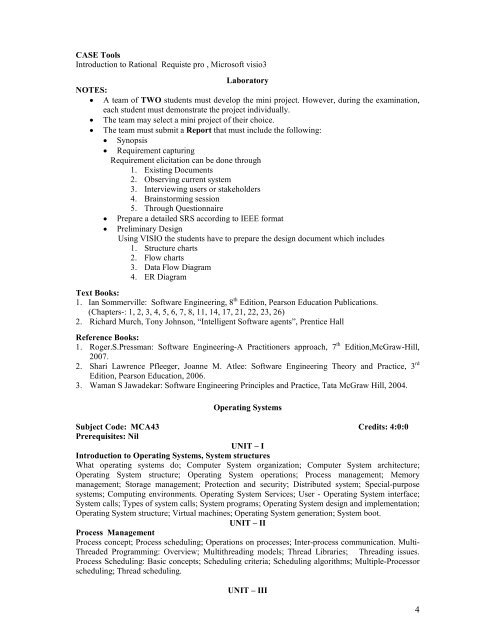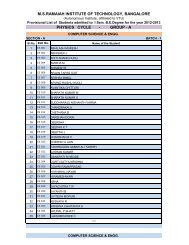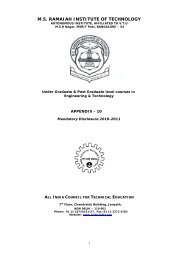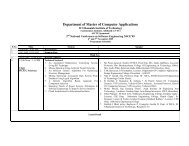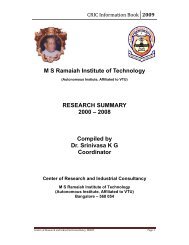M S RAMAIAH INSTITUTE OF TECHNOLOGY, BANGALORE – 560 ...
M S RAMAIAH INSTITUTE OF TECHNOLOGY, BANGALORE – 560 ...
M S RAMAIAH INSTITUTE OF TECHNOLOGY, BANGALORE – 560 ...
Create successful ePaper yourself
Turn your PDF publications into a flip-book with our unique Google optimized e-Paper software.
CASE Tools<br />
Introduction to Rational Requiste pro , Microsoft visio3<br />
Laboratory<br />
NOTES:<br />
• A team of TWO students must develop the mini project. However, during the examination,<br />
each student must demonstrate the project individually.<br />
• The team may select a mini project of their choice.<br />
• The team must submit a Report that must include the following:<br />
• Synopsis<br />
• Requirement capturing<br />
Requirement elicitation can be done through<br />
1. Existing Documents<br />
2. Observing current system<br />
3. Interviewing users or stakeholders<br />
4. Brainstorming session<br />
5. Through Questionnaire<br />
• Prepare a detailed SRS according to IEEE format<br />
• Preliminary Design<br />
Using VISIO the students have to prepare the design document which includes<br />
1. Structure charts<br />
2. Flow charts<br />
3. Data Flow Diagram<br />
4. ER Diagram<br />
Text Books:<br />
1. Ian Sommerville: Software Engineering, 8 th Edition, Pearson Education Publications.<br />
(Chapters-: 1, 2, 3, 4, 5, 6, 7, 8, 11, 14, 17, 21, 22, 23, 26)<br />
2. Richard Murch, Tony Johnson, “Intelligent Software agents”, Prentice Hall<br />
Reference Books:<br />
1. Roger.S.Pressman: Software Engineering-A Practitioners approach, 7 th Edition,McGraw-Hill,<br />
2007.<br />
2. Shari Lawrence Pfleeger, Joanne M. Atlee: Software Engineering Theory and Practice, 3 rd<br />
Edition, Pearson Education, 2006.<br />
3. Waman S Jawadekar: Software Engineering Principles and Practice, Tata McGraw Hill, 2004.<br />
Operating Systems<br />
Subject Code: MCA43 Credits: 4:0:0<br />
Prerequisites: Nil<br />
UNIT <strong>–</strong> I<br />
Introduction to Operating Systems, System structures<br />
What operating systems do; Computer System organization; Computer System architecture;<br />
Operating System structure; Operating System operations; Process management; Memory<br />
management; Storage management; Protection and security; Distributed system; Special-purpose<br />
systems; Computing environments. Operating System Services; User - Operating System interface;<br />
System calls; Types of system calls; System programs; Operating System design and implementation;<br />
Operating System structure; Virtual machines; Operating System generation; System boot.<br />
UNIT <strong>–</strong> II<br />
Process Management<br />
Process concept; Process scheduling; Operations on processes; Inter-process communication. Multi-<br />
Threaded Programming: Overview; Multithreading models; Thread Libraries; Threading issues.<br />
Process Scheduling: Basic concepts; Scheduling criteria; Scheduling algorithms; Multiple-Processor<br />
scheduling; Thread scheduling.<br />
UNIT <strong>–</strong> III<br />
4


